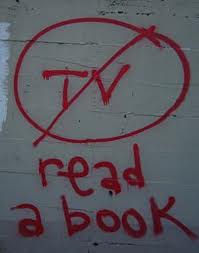Many people in the United States purchase one or fewer books every year.
Many of those people have seen every single episode of American Idol. There is clearly a correlation here.
Access to knowledge, for the first time in history, is largely unimpeded for the middle class. Without effort or expense, it’s possible to become informed if you choose. For less than your cable TV bill, you can buy and read an important book every week. Share the buying with six friends and it costs far less than coffee.
Or you can watch TV.
 The thing is, watching TV has its benefits. It excuses you from the responsibility of having an informed opinion about things that matter. It gives you shallow opinions or false ‘facts’ that you can easily parrot to others that watch what you watch. It rarely unsettles our carefully self-induced calm and isolation from the world.
The thing is, watching TV has its benefits. It excuses you from the responsibility of having an informed opinion about things that matter. It gives you shallow opinions or false ‘facts’ that you can easily parrot to others that watch what you watch. It rarely unsettles our carefully self-induced calm and isolation from the world.
I got a note from someone the other day, in which she made it clear that she doesn’t read non-fiction books or blogs related to her industry. And she seemed proud of this.